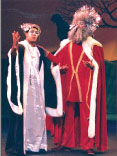Play of Ikhwan al Safa’s
Debate between Man and Animals Draws Large Audience
A Pakistan Link Report
|
Court
scene with the animals and humans debating before
the King of the Djinn-© Andrea Carrillo |
Arif
Gheewala as the Peacock with Asma Alibhai as the Messenger
(center) and Afroz Sajan as the Nightingale-©
Andrea Carrillo |
Another
scene from the play-©
Andrea Carrillo
|
Fourteen hundred people gathered
at the Redondo Beach Performing Arts Center on April 2nd..
to view thisoriginal play, entitled, “Island of the
Animals,” performed by 50 young actors. Based on a
fable written by Muslims from Iraq, it dealt with the rights
and responsibilities entrusted to Man by God through the
scriptures, and the value and contributions of each of the
created species.
Incredibly, this fable was written in the tenth century!
The Ikhwan al Safa (Brethren of Purity) were a group of
intellectuals who are famous for what was, probably, the
first encyclopedic work by Muslims, known as the Rasail
Ikhwan al Safa.. It was a scholarly compendium of scientific,
philosophical and metaphysical information, including mathematics,
astronomy, music, geography and logic. The script was adapted
with some contemporary scenes and references, making it
highly relevant, as we grapple with issues of environmental
pollution, global warming, depletion of the earth’s
finite resources…and how our actions affect other
creatures.
Welcoming the guests, who were from many faith communities,
Mr. Anwar Mohammed, President of the His Highness Prince
Aga Khan Shia Imami Ismaili Council for Western United States,
which hosted the event, began by acknowledging the passing
of Pope John Paul 11 earlier that day, and the audience
showed their respect for the Pontiff by standing for a moment
of silence. “Music, drama, literature, and dance can
be more than mere entertainment, “ said. Mr. Mohammed,
continuing, “ They are the repositories of myths,
values and traditions of a culture… they link us to
the past, while allowing us to recast them into a contemporary
vernacular. Or to use our creativity for new forms of expression.
The arts must be encouraged and celebrated…..for that,
in the end, is a reflection of our humanity.”
 Atif Bhanjee as the King of the Djinn
and
Atif Bhanjee as the King of the Djinn
and
Shaffiq Poonja as the Chief Justice -©
Andrea Carrillo |
The performance was preceded
by a specially prepared documentary on the environment that
included images of the $30 million and 74 acre Al Azhar
Park in Cairo, recently inaugurated by Madame Suzanne Mubarak
and the Aga Khan. Built under the auspices of the Aga Khan
Trust for Culture, it was a gift to a city with one of the
densest urban populations and least amount of green space,
underscoring the message of the play,
With a cast as large as any Broadway show, made more difficult
given the age of the actors (some as young as five), Directors
Zeena Dhalla and Mahmood Hussain, were to be complimented
on the professional production. With magnificent animal
costumes, stunning backdrops, lighting and sets, the fast-paced,
humorous and colorful spectacle was a feast for the senses.
But it was the bees, children under ten, dressed in striped
yellow and black costumes with wings, who stole the show,
as they danced and as the portly Queen Bee threatened to
“tell the men to buzz off,” if they came to
steal their honey. There were moments of tension and serious
reflection also, as the raven accused the audience of being
sinners, too consumed with “building castles of splendor”
and being “heedless of the march of time,” reminding
all of their obligations to God and ethical responsibilities
to their fellow men.
Rt, Rev. Father Alexei of the Archdiocese of Los Angeles
delivered some closing remarks, noting Pope John Paul’s
visits to Casablanca and Damascus and that he would have
approved of this performance, because of its theme and message
and because he had been an actor himself.
The play was being performed that weekend by local actors
from the community, in several cities and was organized
as part of the Ismaili Muslim community’s annual Navruz
celebration. Audience guests included Mr. Shahidul Islam,
Consul for Bangladesh, Mr. Ahmed Farooq and Mr. Shahid Tarar,
Vice Consuls of Pakistan, Mr. Zulfie Sadeque, Consul and
Trade Commissioner for the Canadian Consulate, Dr. Namazikah,
President of the Iranian Muslim Association of North America
and its Board of Trustees, Dr. Nazir Khaja of the Islamic
Information Service, and Mr. Shabbir Mansuri, Director of
the Council on Islamic Education.
Reading about Muslim intellectuals of the past is a pleasure
usually availed of by few. A play, however, allows the heroes
of yesteryear, and their ideas, to come to life and can
be appreciated by young and old. The dramatic arts are an
expressive medium that educate and entertain…and as
this presentation demonstrated, succeeded, to the delight
of the audience.
Link's columnist, Arif Hussaini, was present at the function.
We asked him for his views and this is what he had to say:
“By any measure, it was a splendid play with a subtle
message. Writers throughout history have used animals to
convey their own thoughts. In Eastern literature Kalila
and Damna, Anwar-e- Suhaili in Farsi, several tales in Rumi's
Mathnavi and in Saadi's Gulistan, have used this technique.
In the West, Aesop and Christian Andersen have made a mark
by their superb tales.
-------------------------------------------------------------------------------------

